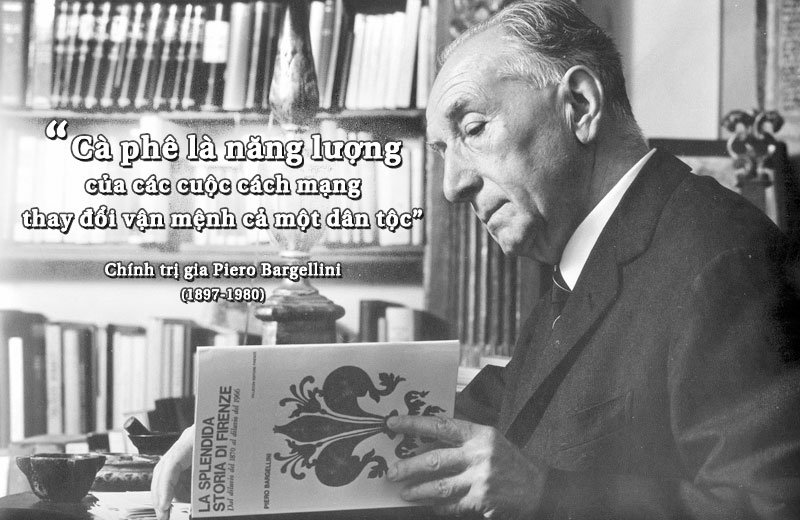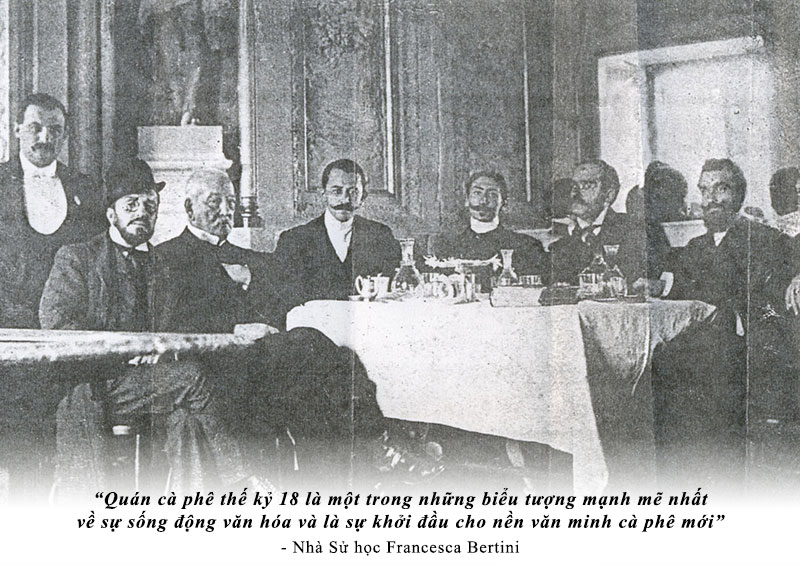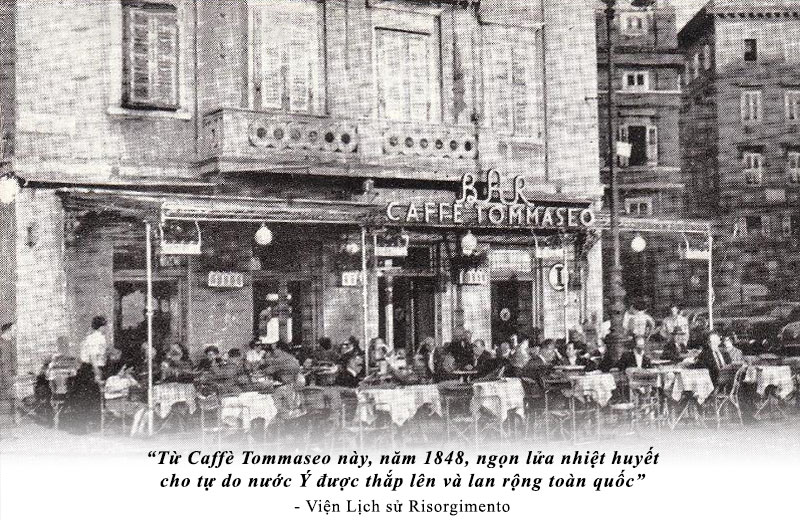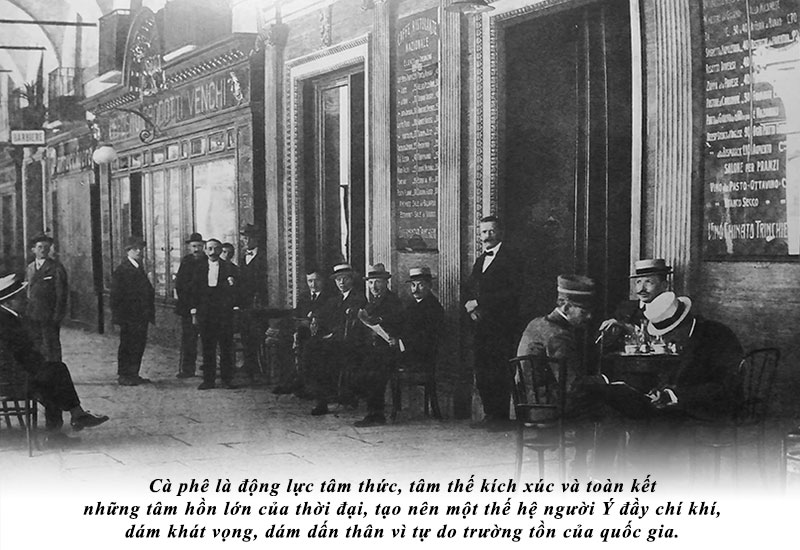Article 28: Coffee and the “Youths of Italy” unified Italy
“It is impossible to write a page of history, politics or art in the 19th century without mentioning the name of a coffee shop. Coffee was the energy of revolutions that changed the destiny of an entire nation.” Politician Piero Bargellini has affirmed so when discussing the role and importance of coffee in the cultural enlightenment movement and the Italian unification movement.

“Coffee was the energy of revolutions that changed the destiny of an entire nation.” Politician Piero Bargellini (1897-1980)
The most important Italian event of the 19th century was the Risorgimento (Revival), an ideological and cultural movement that aroused the national consciousness, the aspiration to recreate the national glory of the Italians. Risorgimento led to a series of events that united the territories and city-states on the Italian peninsula into a single country. This movement was rooted in the concept of revitalizing Italy’s special cultural identity through the dissemination of ideas, education of the self-help will of the nation, the responsibility of each person for the nation’s destiny, and the unity of the Italians to create strength to restore the prosperity of the nation.
The coffee shops of this period were considered as the heart of Risorgimento, the pulse of information, knowledge was constantly moving. That is why, since the mid-17th century, coffee shops in Italy were known as the Free University (Liberissima Università), the Enlightenment Classroom (Classe Culturale Illuminista), the Literary Café (Il Caffè Letterario), and the coffee shop was honored as the “Bevanda Intellettuale” Intellectual Drink…
Books and pictures of great philosophers covered the walls, and on the tables were magazines and periodicals, which made the cafe an enlightening academy, a center for cultural discussion, art, literature, philosophy and even politics. Many doorless cafes “caffè senza porte” would even have people enjoying coffee and chatting all day and night. The phrase “restore al verde” popular during the Risorgimento period originated with poor students, who couldn’t afford to go elsewhere, would come to read and study for hours at a time in the Verde (Green) room of the Caffè Pedrocchi (1772).

The 18th-century cafe was one of the most powerful symbols of cultural vibrancy and the beginning of a new coffee civilization.” – Historian Francesca Bertini
Important political figures such as Camillo Benso, Cesare Balbo, Massimo d’Azeglio, Giuseppe Mazzini… nationalists, patriotic organizations such as the Italian Youth Association “La Giovine Italia”, Neo-Guelph, Carbonari, Neapolitan… all over Italy met at a cafe. Any Italian city-state has a historic cafe. In Milan, the Caffè della Peppina, Caffè-Pasticceria Cova were home to the Italian Youth Union. In Naples, the Gran Caffè Gambrinus was the most popular meeting spot for Neapolitan intellectuals. Caffè dell’Infrascata was where young patriots shouted “Live freedom” and “Long live Italy” before being persecuted in 1801. And on the tables of the Caffè delle Quattro Stagioni, a group of revolutionary journalists co-authored the enlightening magazine “Il Caffè del Molo”…
Caffè Florian (Venice), Caffè Pedrocchi (Padua), Caffè delle Giubbe Rosse (Florence), Caffè Fiorio (Torino), Antico Caffè Greco (Rome), Caffè Tasso (Bergamo), Caffè Tommaseo (Trieste), Caffè dell’Ussero ( Pisa), Caffè dei Cacciatori (Bologna)… went down in Italian history as the venue for strategic discussions for the Risorgimento movement, where the Italian Youth Union, university students, workers and patriotic journalists gathered to form the volunteer army “I Mille – One thousand”. This was also the first military nucleus to play a key role in the liberation and unification movement of Italy.

“From this Caffè Tommaseo, in 1848, the passion for Italian freedom was lit and spread throughout the country” – Risorgimento Historical Institute
On those liberal ships from the south to the north, there was always a coffee chamber. Every time the General – Italian hero Giuseppe Garibaldi (1807 – 1882) drank coffee, he and the I Mille’s army would sing the folk song “Brighter days will soon come”. That group of warriors fought bravely and resiliently, after a series of great victories, the army conquered most of the territories, contributing to the unification of the country geographically.
In 1847, amidst the heroic atmosphere at the Caffè Calosso (Torino), the notes of the national anthem Fratelli d’Italia (Brothers of Italy) were played for the first time, touching the hearts and zealous patriotism of millions of young Italians.
In December 1847, more than 30,000 patriots from all over Italy gathered in the cafés on the Place de la Geneva to celebrate the 101st anniversary of liberation from the Austrian army. When the national anthem was played, the event received the join-in from 40,000 people across the street and turned into Risorgimento’s first great patriotic demonstration.
In February 1848, the politician Massimo d’Azeglio went to the cafe Il Caffè Nazionale (also in Torino) to pass the Albertine Act before its publication. The statutes were the basis of the first Italian Constitution. Since this event, the coffee shops in Torino became a national historical heritage and a symbol of aspiration, of the faith to win the whole of Italy. The promulgation of the constitution at Il Caffè Nazionale was also an important milestone in the journey of forming the first constitutional government. And from here the flame of revolution exploded strongly throughout the Italian peninsula. By 1861, Italy was fully united after centuries of political and geographical division.

Coffee was the driving force of the mind, the mood that stimulated and united the great souls of the times, creating a generation of Italians full of will, daring to aspire, daring to commit themselves to the eternal freedom of the nation.
During the process from the beginning of the aspiration “one indivisible Italy”, defining the identity, educating the national spirit to the unification of Italy, coffee had always played an indispensable role. It can be said that coffee was the driving force of consciousness, the emotional state of mind and the consolidation of great souls of the era, creating a generation of Italians full of will to overcome the differences between the divided territories, creating the miraculous power to re-establish a territorial integrity of Italy, an Italian people with distinct and distinguished cultural characteristics.
THE REAL COFFEE
ROASTED ONLY FOR PEOPLE OF WISDOM!
Source: “The Philosophical Way of Coffee” – copyright by Trung Nguyen Legend


